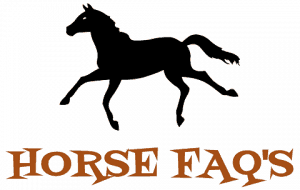Are you a horse enthusiast looking for the best place to buy your new equestrian estate? Look no further! We have compiled a list of the cheapest states to buy horse property. From lush pastures and rolling hills to wide open spaces and stunning natural beauty, there is something for everyone. So, saddle up and read on for a comprehensive guide to buying horse property in the most affordable states across the nation!
The first thing that comes to mind when considering buying horse property is usually its cost. Purchasing land can be an expensive endeavor, but it doesn’t have to be. If you know where to look, you may be able to find great deals on horse properties without breaking the bank. That’s why we have put together this guide – so you can find out which states offer some of the lowest prices on horse properties.
From tax incentives and grants available in certain areas to low real estate markets with plenty of options, we will help you identify which states are the best choice when it comes time to purchase your own slice of equestrian paradise. Read on to discover the cheapest states where you can buy your dream horse property today!
Overview Of Horse Property Market
Horse property has seen a surge in popularity over the past decade. According to the American Horse Council, more than 9 million people in the US own horses and equine-related activities generate an estimated $122 billion annually. With this increase in demand and activity, horse property values have risen as well. So where are some of the cheapest states to buy horse property?
The first factor to consider when looking for affordable horse property is location. While larger metropolitan areas tend to be costlier due to higher land values and taxes, rural areas may offer more economical options depending on the state. For example, Montana and Wyoming are two states with both rural and agricultural land that can provide access to riding trails. Prices for horse properties may also vary according to amenities such as barns and indoor arenas that can add significant costs.
On top of location, taxes have a major impact on pricing when buying horse property. States like Florida, Texas, and Nevada impose lower sales tax rates while others like California have higher rates which can drive up prices significantly. Additionally, some states offer special tax incentives for agricultural properties which could help reduce costs overall. It’s important to research each state’s laws before making any purchase decision so you understand all potential benefits or liabilities you may be taking on.
By evaluating these factors alongside other considerations like zoning regulations and access to services such as veterinarians or farriers, buyers can find the right horse property at a price they can afford.
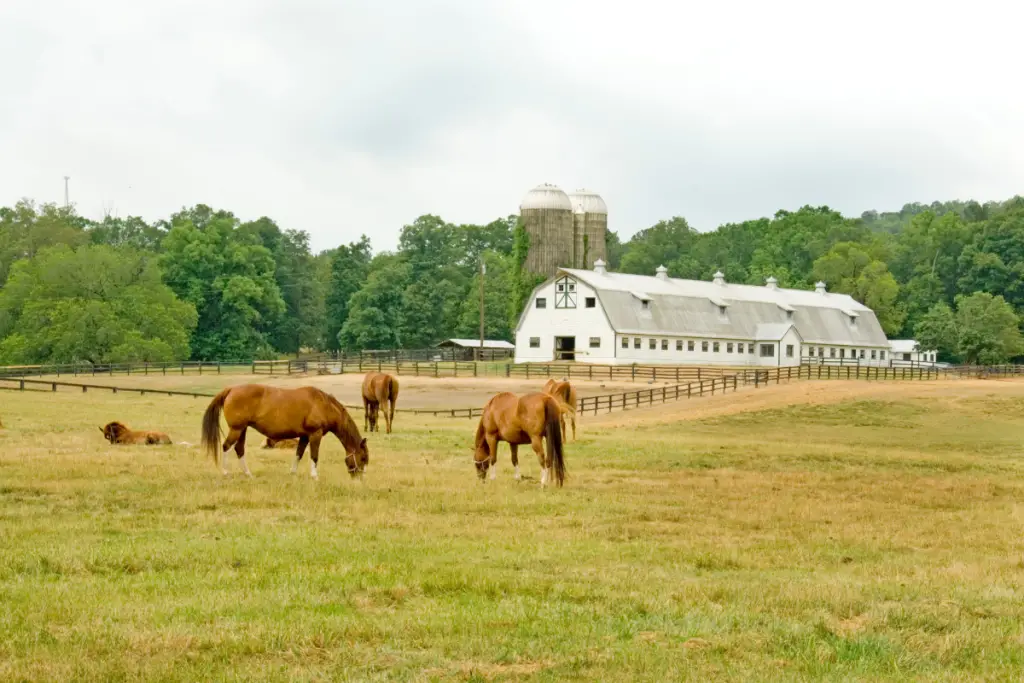
Factors Impacting Horse Property Prices
One of the most luxurious investments for horse-lovers is buying a horse property. But the cost associated with this venture varies greatly. So, what are the key factors that determine the price of a horse property? Let’s take a look!
Contrary to popular belief, land isn’t always the biggest driver of cost when it comes to horse properties. In fact, location and housing type can have an even bigger influence on prices. For example, if you’re looking to buy in an area with high demand and limited availability, you’ll likely pay more than if you purchase in an area with plenty of available land.
On top of that, the type of housing you choose plays a role as well. If you prefer a house with multiple bedrooms and bathrooms or extensive amenities such as stables and paddocks then your costs will be higher than if you opt for something more basic. All these factors come together to form what is ultimately the total cost of your horse property purchase.
Now that we know what impacts pricing, let’s find out how much it might cost in different states across America!
Cost Of Horse Property In Different States
The cost of horse property varies from one state to another. In this section, we’ll explore the cost of horse properties in different states and discuss some factors that affect the price.
Firstly, the cost of horse properties varies according to the location and availability of amenities such as water, electricity, fencing and other infrastructure required for a healthy lifestyle for horses. Secondly, taxes and cost of land also have an impact on the overall cost. Finally, demand-supply dynamics are at play too.
To give you an idea about how much it costs to buy a horse property in different states: in California, prices start from $3 million; in Colorado they range from $1 million to $2 million; while in Texas they begin at around $600K. These prices can be higher or lower depending on factors like location and amenities available.
The next section looks into which states offer horse properties at the most reasonable rates, making them great places for anyone looking to purchase one!
Cost Of Horse Property In Top 10 Cheapest States
Surprisingly, the cost of horse property in the United States can vary greatly. According to a 2019 report, states in the southeastern region of the country tend to have some of the lowest costs. In fact, 4 out of 10 of the cheapest states are located in this region.
The top 10 cheapest states for horse property are: Alabama, Tennessee, Arkansas, Louisiana, Mississippi, South Carolina, Kentucky, Oklahoma, Kansas, and West Virginia. In these states, it is possible to purchase a reasonably sized horse property for under $100k. For instance, in Alabama you may be able to find a three-acre lot with a barn and other features for approximately $50k; whereas in Tennessee you could get a 6-acre lot with similar amenities for around $70k.
Not only do these states offer good value for money but they also have good climates that support year-round riding and training opportunities. Moreover, many of them offer additional incentives such as tax credits which can make buying even more affordable. These factors make these states excellent choices for those looking for an inexpensive way to own and care for horses.
Cost Of Horse Property In Bottom 10 Most Expensive States
For the most discerning equestrian, there’s nothing quite like a horse property in one of the country’s most expensive states! It’s almost unimaginable to think of what kind of extravagance and luxury can be found when shopping for horse properties in these places. But just how much will it cost? Well, buckle up because we’re about to explore the eye-watering prices of horse property in the bottom 10 most expensive states.
The first thing to keep in mind is that the cost of horse property is affected by location, size, and amenities. For example, a horse property in California may have a much higher price tag than one located in Montana – even if both properties are relatively similar in size and amenities. That said, let’s take a look at some of the priciest states for horse properties:
Hawaii tops our list with an average price tag for a 10-acre lot reaching $4 million or more! Other pricey states include California with costs ranging from $1 million to $3 million; Connecticut at around $2 million; Massachusetts coming in at $1.5 million; New York clocking in at around $2 million; and finally Maryland, Virginia, Washington D.C., Delaware, and Rhode Island all costing upwards of $1 million per 10 acres.
So while these numbers might seem astronomical – they don’t necessarily tell the whole story. To get an accurate view on whether buying a horse property is worth it or not – we’ll need to look into the pros and cons of each state…
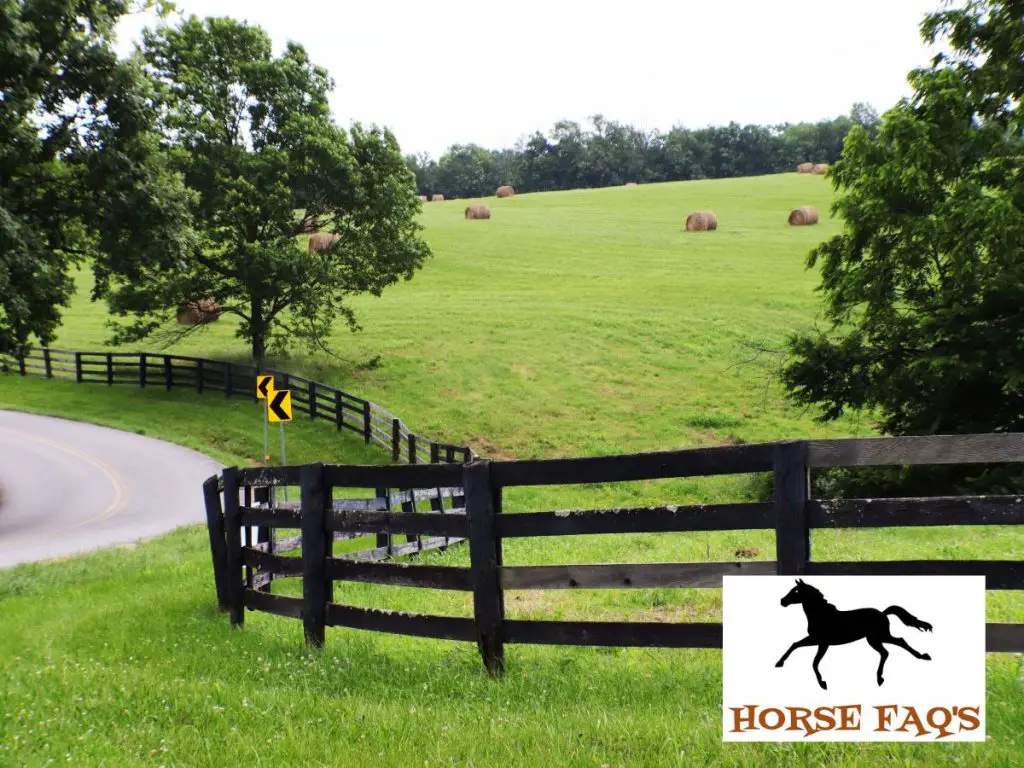
Pros And Cons Of Horse Property In Various States
When it comes to buying a horse property, there are many factors to consider. From location to cost, there are pros and cons that vary from state-to-state. In this section, we’ll take a look at the advantages and drawbacks of setting up shop in different states.
One of the biggest advantages of owning a horse property in any state is access to outdoor activities like riding trails, hunting grounds and parks. Different states also offer different types of vegetation, climate and terrain that can be beneficial or harmful depending on the type of horses you own. Additionally, some states may have more tax breaks or other financial incentives than others when it comes to purchasing land for your horses.
On the other hand, living in certain locations might not be ideal for your horses due to severe weather conditions. Additionally, some states may have stricter regulations for housing animals or limited resources for veterinary care. Moreover, the cost of living in certain areas might also affect how much money you need in order to sustain your horse property.
Taking all these factors into account is key when deciding where you want to buy a horse property. The next section will provide an in-depth comparison of the cost involved with buying a horse property in each state so you can make an informed decision about where your dream home should be located.
Cost Comparison Of Horse Property In Different States
When it comes to buying horse property, cost comparison can be a major factor. Knowing the average price per acre in different states can help you make an informed decision when deciding where to invest. In this section, we’ll compare the cost of horse property across different states.
The most expensive states to buy horse property are California, Colorado, and New York. In these states, an acre of land can range from $2-4 million dollars. On the other hand, less populated states tend to be more affordable for purchasing horse property. Arkansas, Mississippi and Kansas have some of the lowest prices at around $1,000-$3,000 per acre.
In between those extremes are states like Texas and Florida which offer a mix of rural and urban areas with various costs depending on location. Generally speaking, however, these two states offer relatively reasonable prices compared to their coastal counterparts.
It’s important to keep in mind that cost is only one factor when considering whether or not it’s worth investing in horse property in any given state. There are numerous other factors to consider before making any final decisions.
What To Consider Before Buying Horse Property
When considering purchasing horse property, there are a few things to think about. Firstly, you should consider the cost of land in the area. Many states have varying prices for land and it is important to figure out what the best deal is for you. Secondly, you should look at what amenities are available. Are there equine-friendly trails or parks nearby? What type of fencing is required or recommended? Lastly, take into account the local regulations regarding keeping horses on your property. It’s important to make sure that you can keep your horses safe while following all necessary laws and regulations.
Another factor to consider when buying horse property is the upkeep costs associated with having animals on the property. Maintenance such as regular grooming, feed costs, potential boarding fees and more must be taken into account so that you can budget accordingly. Additionally, depending on where you live, there may be additional fees such as taxes or other insurance costs which will add up and need to be accounted for in your budgeting plan.
Once these considerations have been taken into account, it’s time to start looking at properties available in different states and comparing their cost against their features and amenities. Knowing this information will help inform your decision-making process and help ensure that you get the best deal possible for your horse property purchase. From here, researching the advantages of buying horse property in cheaper states can help further inform your decision-making process before committing to a purchase.
Advantages Of Buying Horse Property In Cheaper States
When you’re looking to buy a horse property, it’s important to consider the advantages of buying in cheaper states. While some of us may be tempted to aim for the more expensive markets, there are many benefits to opting for a more cost-effective option. Here are a few things to keep in mind when it comes to buying horse properties in the cheapest states:
- Lower taxes: Most states have lower taxes on properties than those found in more expensive locations. This means that you can save money on your overall purchase price and have more cash left over for other investments or expenses.
- Less competition: When there are fewer buyers competing for the same property, you may be able to get a better deal on your purchase. That means you’ll pay less for an overall property and have more money leftover for additional investments or improvements you might want to make later down the road.
- Lower insurance costs: In many cases, insurance premiums will be lower in cheaper states as well, which can save you even more money when it comes time to purchase your horse property.
- More options: Cheaper states often offer a larger variety of different types of horse properties compared to their more expensive counterparts, giving you lots of choices when it comes time to choose one that suits your needs best and fits within your budget.
- Better quality amenities: Just because something is cheaper doesn’t mean it has to be low-quality; many horse properties located in cheaper states still offer excellent amenities such as riding arenas and stables that provide top-notch care for your horses.
When weighing up the pros and cons of buying horse property in the cheapest states, these five points should certainly help make it easier to decide whether this is the right choice for you or not – without sacrificing quality or opportunity along the way! With all that said, finding the right horse property in these locations is still key – so let’s take a look at how we can do just that!
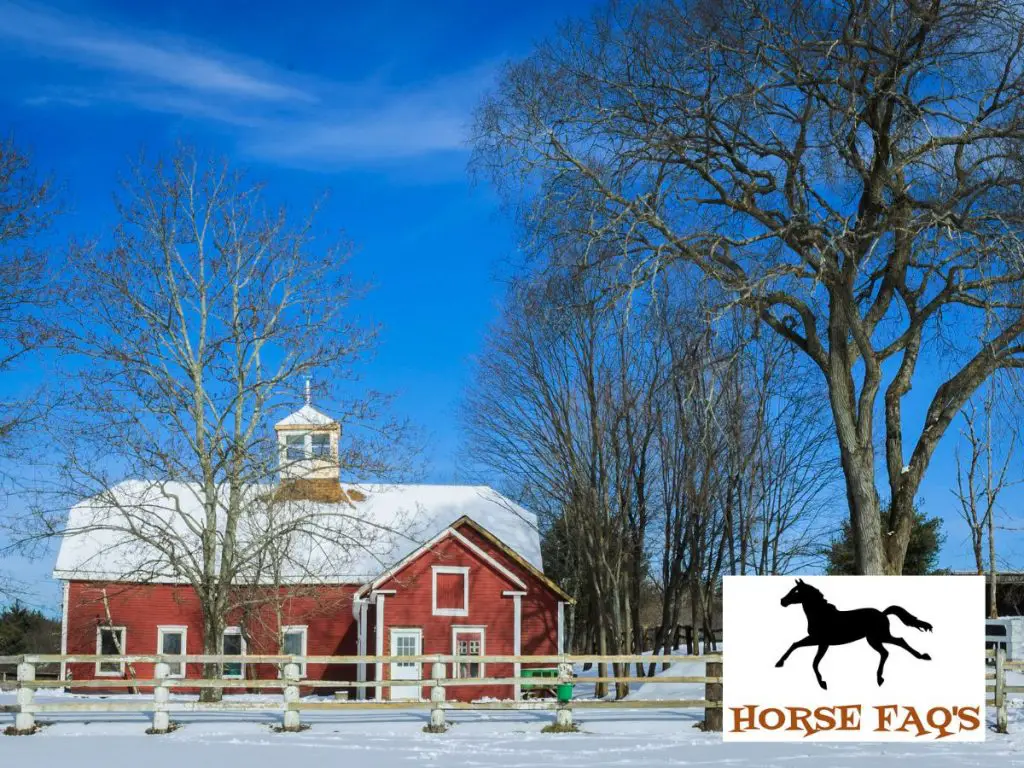
Finding The Right Horse Property In The Cheapest States
Ah, the joys of buying horse property in the cheapest states. We can just imagine it: rolling hills, a gorgeous barn, and some of the lowest prices in the country. It’s no wonder so many people are looking for their perfect horse property.
But finding that perfect piece of horse property isn’t always easy. Here are four tips to help you find your dream horse property in any of these budget-friendly states:
- Know what kind of horse property you’re looking for. Do you need an indoor riding arena? Stables? A large pasture? Having a clear idea of what type of horse property you need will help narrow down your search.
- Research local zoning laws. Some areas have strict regulations on keeping horses and other animals, such as noise ordinances or fencing requirements, so make sure you know what the rules are before starting your search.
- Look into tax incentives and other cost savings. Many states offer tax credits or other incentives for purchasing horse properties, so be sure to check out what’s available in your area before making any decisions.
- Contact local real estate agents and breeders for advice. They may have insider knowledge about potential properties or even be able to recommend trusted sellers or brokers who can help you find the perfect place for your horses.
No matter where you decide to buy your horse property, there is sure to be something out there that fits both your needs and budget! So get out there and start shopping – with these tips in mind, you’ll be sure to find exactly what you’re looking for!
Frequently Asked Questions
What Type Of Horse Property Is Best For My Needs?
When considering what type of horse property is best for your needs, it’s important to weigh the pros and cons of each option. To help you make a decision, here’s a list of factors to consider:
- Location: Where do you want your horse property to be located? Consider the cost of living in the area, as well as access to nearby amenities such as veterinary care and equestrian trails.
- Size: How much land do you need? The size of the land will affect how much you’ll pay in taxes and maintenance costs.
- Amenities: Do you need stables, barns or other features? Take into account the cost of building or buying these structures when deciding on a property.
It’s also wise to consider budget constraints and any restrictions on usage that may come with certain properties. If you’re looking for a bargain, research which states have the lowest taxes or offer incentives for horse owners. Doing your research before investing in horse property will help ensure that you find the perfect fit for your needs.
How Do I Find The Best Horse Property For The Lowest Cost?
For those looking to buy horse property at the lowest cost, research and patience are key. Surprisingly, the average price of horse properties in the U.S. is $560,000 – a hefty sum for most people! But with the right approach, you can find great options that fit your budget in some of the least expensive states in the country.
One of the best places to start when researching for cheap horse property is by checking out rural areas. Smaller towns often have lower costs of living than large cities and may also offer more affordable real estate options. You can also look into states with inexpensive taxes or agricultural grants that make buying land easier on your wallet. For example, Iowa offers a loan program specifically for agricultural purposes like buying or improving land for horses.
The internet is an invaluable tool when it comes to finding good deals on horse properties. Online listings can be filtered by location and price range to narrow down your search, while sites like Zillow provide detailed information about each listing so you can easily compare prices across different areas. Additionally, many local real estate agents specialize in helping people find horse properties in their area, so don’t hesitate to reach out if you need help getting started!
Are There Any Special Considerations For Horse Property In Certain States?
When searching for horse property, it’s important to consider the location. Different states have different regulations and taxes that can impact the cost of owning a horse. The cheapest states to buy horse property may vary depending on your budget and what you’re looking for in a property.
For example, some locations may require more land or fewer restrictions, which can drive up the costs. Additionally, certain states may offer tax incentives that could help reduce the overall cost of purchasing a horse property. It’s worth doing research on the state you’re interested in to determine what types of regulations they have in place and if they offer any special considerations when it comes to buying horse property.
It’s also important to consider the local market when shopping for a horse property. Prices will vary depending on location, so be sure to compare prices between different areas before making an offer on a specific piece of land. Additionally, look into any additional fees associated with purchasing the property such as closing costs or transfer taxes that could add up quickly if not accounted for ahead of time.
Ultimately, finding the best horse property at the lowest cost requires research and careful consideration of all factors involved including location-specific regulations, tax incentives, local markets, and additional fees associated with purchase. Taking all these elements into account can help narrow your search and save money in the long run.
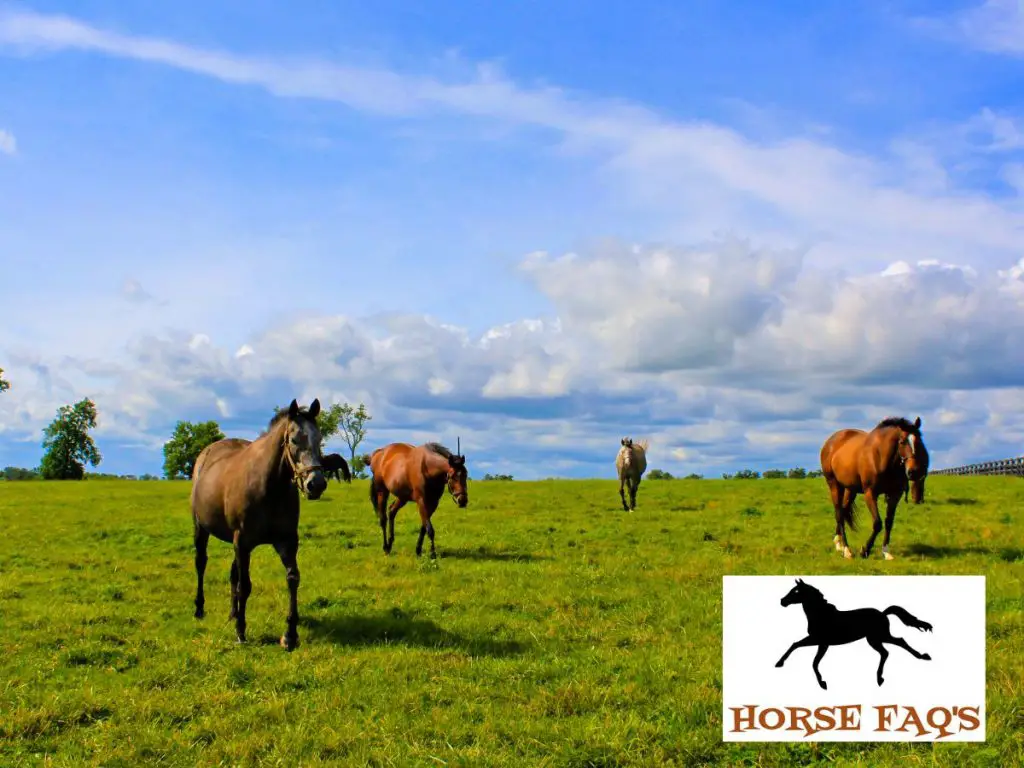
Are There Any Tax Incentives For Buying Horse Property In The Cheapest States?
When it comes to buying horse property, one of the most important factors to consider is the cost. While certain states may have lower costs for purchasing horse property, there may be additional tax incentives for doing so. In this article, we’ll explore some of the cheapest states to buy horse property, and whether or not there are any tax benefits associated with them.
One of the best ways to identify the cheapest states to purchase horse property is by looking at their respective housing markets and their real estate taxes. For example, Alabama has some of the lowest real estate taxes in the nation, which makes it an attractive destination for those looking to purchase a piece of horse property. Additionally, in most areas of Alabama, there are no statewide transfer taxes on real estate transactions.
It’s also important to look into whether or not a particular state offers any special tax incentives for those who decide to invest in horse property. For example, Florida has a homestead exemption that can provide significant tax relief if you own and operate a horse-related business on your property. Other potential tax incentives may include sales tax exemptions for feed and hay used for horses kept on the premises as well as deductions for repair costs associated with maintaining your property.
Clearly, when considering where you should purchase your next piece of horse property, it pays off to do your research first and see what types of financial benefits each state offers. Knowing which states offer favorable tax conditions could help you save money on your future investment.
Are There Any Additional Costs Associated With Horse Property That I Should Be Aware Of?
When it comes to buying horse property, the price tag may seem like a bargain – but it’s important to remember that there are often additional costs associated with such a purchase. While many people assume that these costs will be negligible, the reality is quite different – and can often be quite expensive.
It is ironic that although purchasing horse property in the cheapest states might appear to provide a great deal of savings initially, the real cost of ownership could end up being much more substantial than expected. There are numerous additional costs which must be taken into account when considering this type of investment, including fencing and stables, feed and hay, veterinary services, and various taxes and fees. Property owners should also be aware that some areas require permits for keeping horses on their land.
All these expenses can add up quickly, so prospective buyers should do plenty of research before committing to a purchase. It’s essential to understand what all the associated costs will be in order to make an informed decision about whether or not buying horse property is right for them.
Conclusion
In conclusion, many factors can affect the cost of horse property. It’s important to do research and consider your own needs before making a purchase. While there are some states that offer the lowest prices for horse properties, you’ll still want to take into account any taxes or additional costs associated with buying the property.
However, don’t let these considerations prevent you from getting the property that you need. With careful planning and budgeting, it is possible to get the horse property that is right for your needs without breaking the bank. Additionally, many states offer tax incentives for purchasing horse property that can help offset some of the costs associated with it.
Finally, if you’re concerned about finding a good deal on horse property, remember that there are plenty of resources available online to help you find what you’re looking for at the best price possible. With a little bit of research and patience, you should be able to find the perfect horse property for your needs without having to worry about breaking your budget.
